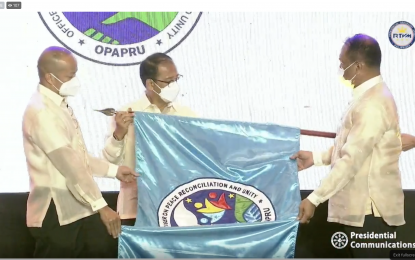
OPAPRU. Presidential Adviser on Peace, Reconciliation and Unity Secretary Carlito Galvez Jr. (center) leads the raising of the new flag of the Office of the Presidential Adviser on Peace, Reconciliation and Unity (OPAPRU) on Wednesday (March 23, 2022) at the PICC in Pasay City. OPAPRU officially transitioned from the Office of the Presidential Adviser on the Peace Process (OPAPP). (Screengrab from RTVM live stream)
MANILA – More inclusive, responsive, and holistic approach to peace-building efforts assured as the Office of the Presidential Adviser on the Peace Process (OPAPP) officially transitioned to Office of the Presidential Adviser on Peace, Reconciliation, and Unity (OPAPRU) on Wednesday.
Secretary Carlito Galvez Jr., Presidential Adviser on Peace, Reconciliation and Unity, said the OPAPRU is not only committed to transforming the lives of its beneficiaries, their families, and communities, but also “focusing on improving the organization’s systems, processes, and procedures in order to more effectively and efficiently implement" its sustainable programs and projects on-ground.
“If there is one thing we have learned in our almost three decades of peace-building efforts, it is the need for greater collaboration and complementation,” Galvez said during the official launching of OPAPRU at the Philippine International Convention Center (PICC) in Pasay City.
With this transition, Galvez vowed the OPAPRU will continue to strengthen its mission to supervise all aspects of the comprehensive Philippine peace process and boost the promotion of national reconciliation and unity.
Galvez said the OPAPRU remains steadfast in fulfilling its mission to putting an end to the culture of violence; transform the lives of former combatants; as well as improve relationships among former rebels, communities, and government institutions by pushing a long-lasting peace in the country.
President Rodrigo Roa Duterte signed an executive order (EO) 158 on Dec. 27, 2021, reorganizing and renaming the OPAPP to the OPAPRU.
Galvez said the OPAPRU’s transition will be an expanded operation of the government's peace-building efforts and a follow-up of the remaining peace engagements in the country.
“Our organization is not only focused on fulfilling the national government’s commitments under all signed peace agreements but is also fostering reconciliation and unity among our people,” he added.
Despite the Covid-19 pandemic, Galvez said the OPAPRU continued to respond to the emerging peace issues on the ground and is determined “more than ever” to sustain the gains of the peace processes undertaken by the Duterte administration.
The OPAPRU’s six major programs implemented for the returning combatants have improved their communities and the lives of the people, he said.
“Under the Duterte administration, these former combatants are making the transition not only as farmers, traders, and entrepreneurs but also as peacekeepers and peace-builders. They are testament that good things come to those who walk the path of peace,” he added.
Gains of localized peace processes
Galvez cited the decommissioned members of the Moro Islamic Liberation Fronts (MILF) in Maguindanao have become the government’s partner in pursuing peace, unity, and developments in the province.
The Moro National Liberation Front (MNLF) members in Jolo, Sulu have likewise helped the provincial government to address local conflicts such as encouraging members of emerging extremist groups in the area to lay down their arms and return to the folds of the law.
The OPAPRU’s push for stabilization of peace programs on the ground has also led to the declaration of communist terrorist groups (CTGs) persona non-grata by all the local government units (LGUs) in Central Luzon.
Galvez said returned members of the Cordillera Bodong Administration-Cordillera People’s Liberation Army (CBA-CPLA) in Cordillera region as well as the Rebolusyonaryong Partido Manggawa-Pilipinas/Revolutionary Proletarian Army/Alex Boncayao Brigade-Tabara Paduano Group (RMP-P/RPA/ABB-TPG) are now boosting their livelihood income with the help of the government under the signed peace agreement.
Social healing and peace efforts for the former members of the infamous Daesh-inspired Maute terrorist group in Marawi City are now being carried out with a series of peace conversations and interreligious dialogues, he said.
The socio-economic assistance and infrastructure program in Davao del Norte also uplift the lives of the conflict-afflicted indigenous peoples (IPs) in Davao del Norte, he added.
Galvez noted conduct of localized peace engagements (LPEs) also resulted in the surrendering of hundreds of communist rebels.
The implementation of the conflict-sensitive and peace-building mechanisms, he added, have enabled the LGUs to effectively address the roots of the armed conflict “and are now reaping the dividends of peace.”
EO No. 158 operationalized the policy framework on peace, reconciliation, and unity with three principles, namely conflict-sensitive and peace-promoting, whole-of-society, and empowering. (PNA)
